外研版必修五Module 1 British and American English grammar(共24页ppt)
文档属性
| 名称 | 外研版必修五Module 1 British and American English grammar(共24页ppt) |
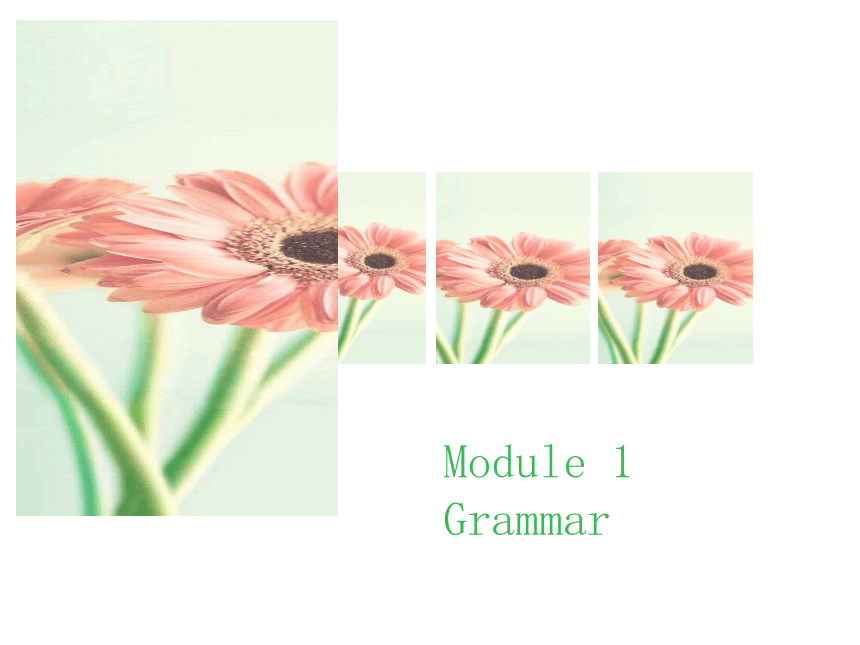
|
|
| 格式 | zip | ||
| 文件大小 | 5.7MB | ||
| 资源类型 | 教案 | ||
| 版本资源 | 外研版 | ||
| 科目 | 英语 | ||
| 更新时间 | 2020-07-21 00:00:00 | ||
图片预览



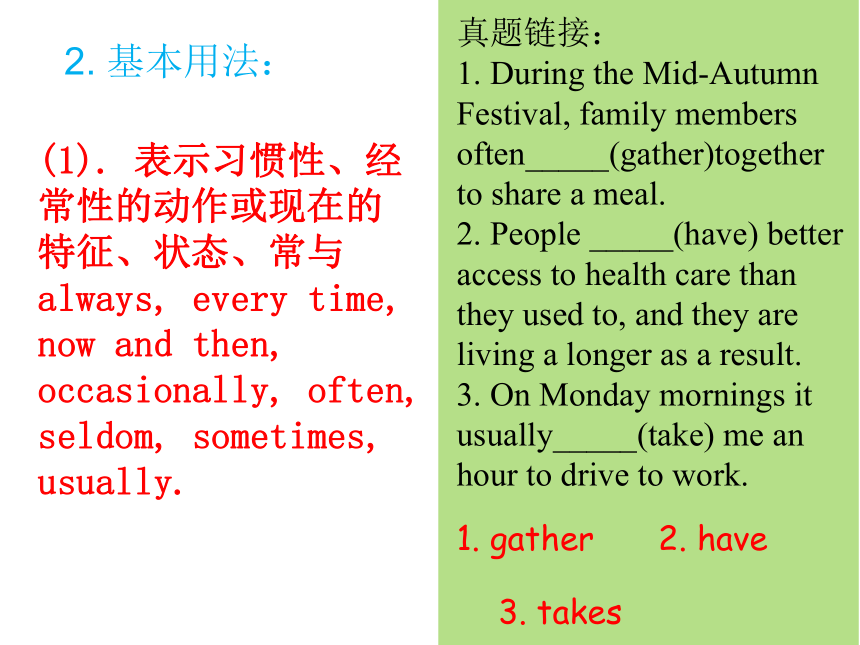
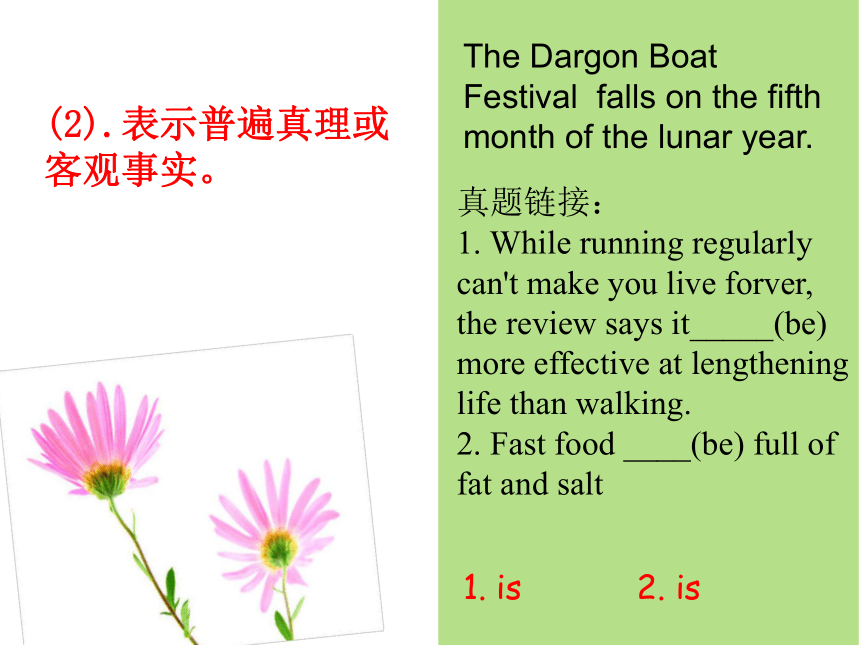

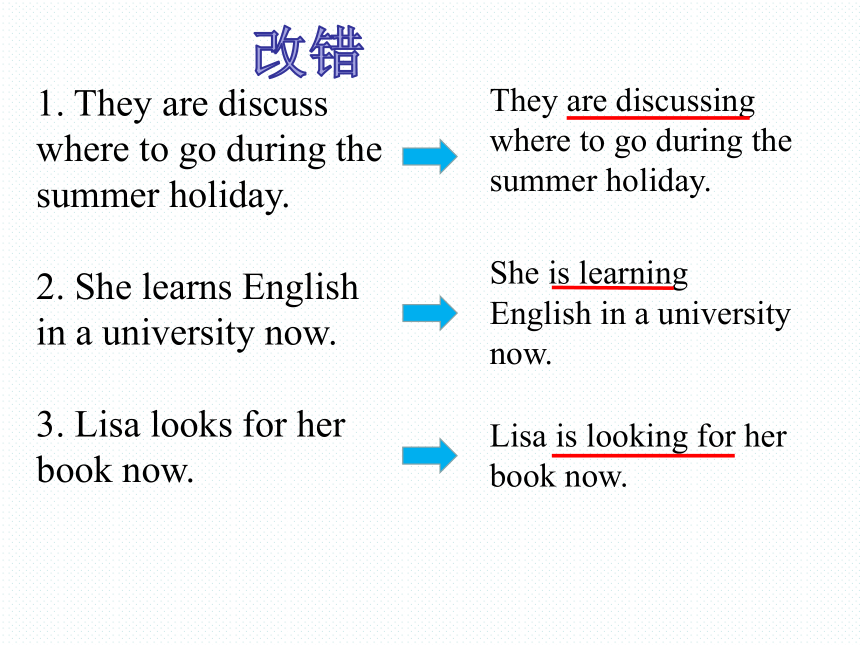

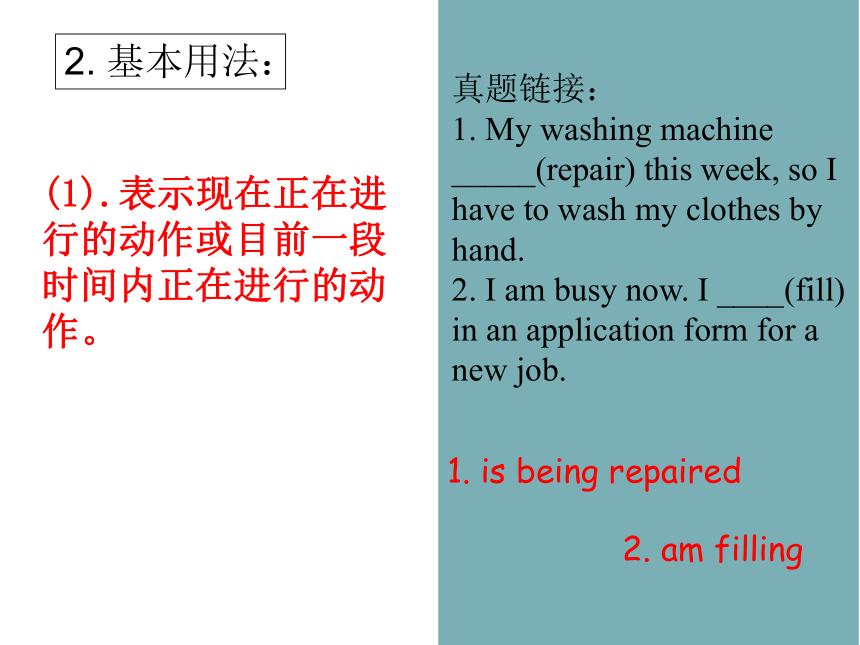
文档简介
(共24张PPT)
Module
1
Grammar
Let's
have
fun!
--My
uncle
has
1000
under
him.
--He
is
really
somebody,
what
does
he
do?
--A
maintenance
man
in
a
cemetery.
我的叔叔下面有1000人。
他真是个大人物,他是做什么的?
守墓人。
一、一般现在时
1.构成:主语+动词原型(主语是第三人称单数,谓语动词用三单)
被动形式为:be
done
2.
基本用法:
(1).
表示习惯性、经常性的动作或现在的特征、状态、常与always,
every
time,
now
and
then,
occasionally,
often,
seldom,
sometimes,
usually.
真题链接:
1.
During
the
Mid-Autumn
Festival,
family
members
often_____(gather)together
to
share
a
meal.
2.
People
_____(have)
better
access
to
health
care
than
they
used
to,
and
they
are
living
a
longer
as
a
result.
3.
On
Monday
mornings
it
usually_____(take)
me
an
hour
to
drive
to
work.
1.
gather
2.
have
3.
takes
The
Dargon
Boat
Festival
falls
on
the
fifth
month
of
the
lunar
year.
(2).表示普遍真理或客观事实。
真题链接:
1.
While
running
regularly
can't
make
you
live
forver,
the
review
says
it_____(be)
more
effective
at
lengthening
life
than
walking.
2.
Fast
food
____(be)
full
of
fat
and
salt
1.
is
2.
is
(3).
表示将来。
01.在时间和条件状语从句中,常用一般现在时代替一般将来时。
02.
表示按规定、计划或时间表将要发生的动作,有此用法的动词有:go,
come,
leave,
start,
begin,
arrive,take
off等。
真题链接:
1.
You
had
better
write
down
her
phone
number
before
you
_____(forget)
it.
2.
Unless
some
extra
money
____(find),
the
theater
will
close.
3.
A
Midsummer
Night's
Dream
_____(open)
at
the
Theatre
Royal
on
19th
June.
4.
The
meeting
____(begin)
at
2
o'clock
in
the
afternoon.
1.
forget
2.
is
found
3.
opens
4.
begins
1.
They
are
discuss
where
to
go
during
the
summer
holiday.
2.
She
learns
English
in
a
university
now.
3.
Lisa
looks
for
her
book
now.
They
are
discussing
where
to
go
during
the
summer
holiday.
She
is
learning
English
in
a
university
now.
Lisa
is
looking
for
her
book
now.
二、现在进行时
1.构成:be+v.ing
被动形式为
be
being
done
(1).表示现在正在进行的动作或目前一段时间内正在进行的动作。
真题链接:
1.
My
washing
machine
_____(repair)
this
week,
so
I
have
to
wash
my
clothes
by
hand.
2.
I
am
busy
now.
I
____(fill)
in
an
application
form
for
a
new
job.
1.
is
being
repaired
2.
am
filling
2.
基本用法:
(2)与always,
constantly,
contiunally
等副词连用,表示某种强烈的感彩,并不强调动作正在进行
真题链接:
1.
She
is
always
____(help)
other
people.
2.
She
is
always
_____(think)
more
of
others
than
of
himself.
1.
helping
2.
thinking
(3).go,come,leave,
start,take
off
等趋向性动词的现在进行时可以表示按最近的计划或安排要发生的动作,或即将开始结束的动作
真题链接:
1.
Lucy
_____(come)
to
see
me
the
day
after
tomorrow.
2.
Ladies
and
gentlemen,
please
fasten
your
seat
belt.The
plane
_____(take)
off.
1.
is
coming
2.
is
taking
三、一般将来时
1.构成:will
\shall
do
第一人称后常用will\shall,
第二三人称后常用will.
被动语态为will\shall
be
done
(1).表示将要发生的动作或存在的状态。常和tomorrow,
next
week,
this
evening,
a
few
days等将来时间状语连用。
2.
基本用法:
真题链接:
1.
Wasn't
Joan
supposed
to
be
here
by
now?
--Don't
worry.
She_____(be)
here
in
about
twenty
minutes.
2.
Dr.
Jackson
is
not
in
his
office
at
the
moment.
--All
right.
I
____(call)
him
later.
1.will
be
2.
will\shall
call
(2).表示将来反复发生的动作或习惯性动作。
真题链接:
1.
The
students
will
have
five
English
classes
per
week
this
term.
2.
Follow
the
doctor's
advice,
and
you
will
be
well
soon.
(3).用于
祈使句+and+陈述句
中,陈述句常用一般将来时。
(1).be
going
to
do
表示按计划打算做...,或有迹象表明要发生的动作或出现的状况。
2.
其他表达方式:
be
going
to
和will区别???
be
going
to
do
表示说话人事先经过考虑的想法或有迹象表明某事要发生。
will
表示说话人临时决定做的事情或说话人主观认为某事会发生。
1.
I_______pick
him
up
at
the
railway
station
this
afternoon.
2.
This
is
a
heavy
box.
I
______help
you
carry
it.
1.
am
going
to
2.
will
(2)
be
about
to
do.表示即将、正要做某事,不与具体时间状语连用,常与when连用,构成“
be
about
to
do...when...”结构
1.
I
was
about
to
go
to
have
dinner
when
he
called
me
up.
2.
The
medical
team
is
about
to
leave
for
Japan
to
rescue
people
trapped
there
because
of
the
terrible
disaster.
(3)
be
to
do
表示命令、计划、安排或注定要发生的事。
1.
You
are
to
return
the
book
before
Friday.
2.
I
am
to
meet
Mr
Brown
at
eleven
this
morning.
3.
His
continuous
effort
is
to
make
him
a
successful
man.
四、现在完成时
1.构成:
have\
has
done
被动形式为have\
has
been
done
(1).表示过去发生的动作产生的结果或对现在造成的影响。
常与yet,
already,
recently,
before,
since,
up
to
now,
in
the
past...,
for..years,
等连用。
2.
基本用法:
1.
I
have
been
to
New
York
three
times
up
to
now.
2.
Have
you
finished
your
homework
yet?
(2).表示动作从过去某时开始一直持续到现在,并有可能继续持续下去,常与段时间的时间状语连用。
He
has
worked
here
for
over
twenty
years.
1.
China's
high-speed
railways_____(grow)
from
9,000
to
25,000
kilometers
in
the
past
few
years.
2.
In
the
last
few
years,
China_____(make)
great
achievements
in
environmental
protection.
1.
have
grown
2.
has
made
改错:
When
I
look
at
this
picture
of
myself,
I
realize
how
fast
time
flies.
I
had
grown
not
only
physically
,
but
also
mentally
in
the
past
few
years.
have
He
_________(do)
his
homework.
He
_________(do)
his
homework.
He
_________(do)
his
homework.
He
_________(do)
his
homework.
does
will
do
is
doing
has
done
Thank
you
Module
1
Grammar
Let's
have
fun!
--My
uncle
has
1000
under
him.
--He
is
really
somebody,
what
does
he
do?
--A
maintenance
man
in
a
cemetery.
我的叔叔下面有1000人。
他真是个大人物,他是做什么的?
守墓人。
一、一般现在时
1.构成:主语+动词原型(主语是第三人称单数,谓语动词用三单)
被动形式为:be
done
2.
基本用法:
(1).
表示习惯性、经常性的动作或现在的特征、状态、常与always,
every
time,
now
and
then,
occasionally,
often,
seldom,
sometimes,
usually.
真题链接:
1.
During
the
Mid-Autumn
Festival,
family
members
often_____(gather)together
to
share
a
meal.
2.
People
_____(have)
better
access
to
health
care
than
they
used
to,
and
they
are
living
a
longer
as
a
result.
3.
On
Monday
mornings
it
usually_____(take)
me
an
hour
to
drive
to
work.
1.
gather
2.
have
3.
takes
The
Dargon
Boat
Festival
falls
on
the
fifth
month
of
the
lunar
year.
(2).表示普遍真理或客观事实。
真题链接:
1.
While
running
regularly
can't
make
you
live
forver,
the
review
says
it_____(be)
more
effective
at
lengthening
life
than
walking.
2.
Fast
food
____(be)
full
of
fat
and
salt
1.
is
2.
is
(3).
表示将来。
01.在时间和条件状语从句中,常用一般现在时代替一般将来时。
02.
表示按规定、计划或时间表将要发生的动作,有此用法的动词有:go,
come,
leave,
start,
begin,
arrive,take
off等。
真题链接:
1.
You
had
better
write
down
her
phone
number
before
you
_____(forget)
it.
2.
Unless
some
extra
money
____(find),
the
theater
will
close.
3.
A
Midsummer
Night's
Dream
_____(open)
at
the
Theatre
Royal
on
19th
June.
4.
The
meeting
____(begin)
at
2
o'clock
in
the
afternoon.
1.
forget
2.
is
found
3.
opens
4.
begins
1.
They
are
discuss
where
to
go
during
the
summer
holiday.
2.
She
learns
English
in
a
university
now.
3.
Lisa
looks
for
her
book
now.
They
are
discussing
where
to
go
during
the
summer
holiday.
She
is
learning
English
in
a
university
now.
Lisa
is
looking
for
her
book
now.
二、现在进行时
1.构成:be+v.ing
被动形式为
be
being
done
(1).表示现在正在进行的动作或目前一段时间内正在进行的动作。
真题链接:
1.
My
washing
machine
_____(repair)
this
week,
so
I
have
to
wash
my
clothes
by
hand.
2.
I
am
busy
now.
I
____(fill)
in
an
application
form
for
a
new
job.
1.
is
being
repaired
2.
am
filling
2.
基本用法:
(2)与always,
constantly,
contiunally
等副词连用,表示某种强烈的感彩,并不强调动作正在进行
真题链接:
1.
She
is
always
____(help)
other
people.
2.
She
is
always
_____(think)
more
of
others
than
of
himself.
1.
helping
2.
thinking
(3).go,come,leave,
start,take
off
等趋向性动词的现在进行时可以表示按最近的计划或安排要发生的动作,或即将开始结束的动作
真题链接:
1.
Lucy
_____(come)
to
see
me
the
day
after
tomorrow.
2.
Ladies
and
gentlemen,
please
fasten
your
seat
belt.The
plane
_____(take)
off.
1.
is
coming
2.
is
taking
三、一般将来时
1.构成:will
\shall
do
第一人称后常用will\shall,
第二三人称后常用will.
被动语态为will\shall
be
done
(1).表示将要发生的动作或存在的状态。常和tomorrow,
next
week,
this
evening,
a
few
days等将来时间状语连用。
2.
基本用法:
真题链接:
1.
Wasn't
Joan
supposed
to
be
here
by
now?
--Don't
worry.
She_____(be)
here
in
about
twenty
minutes.
2.
Dr.
Jackson
is
not
in
his
office
at
the
moment.
--All
right.
I
____(call)
him
later.
1.will
be
2.
will\shall
call
(2).表示将来反复发生的动作或习惯性动作。
真题链接:
1.
The
students
will
have
five
English
classes
per
week
this
term.
2.
Follow
the
doctor's
advice,
and
you
will
be
well
soon.
(3).用于
祈使句+and+陈述句
中,陈述句常用一般将来时。
(1).be
going
to
do
表示按计划打算做...,或有迹象表明要发生的动作或出现的状况。
2.
其他表达方式:
be
going
to
和will区别???
be
going
to
do
表示说话人事先经过考虑的想法或有迹象表明某事要发生。
will
表示说话人临时决定做的事情或说话人主观认为某事会发生。
1.
I_______pick
him
up
at
the
railway
station
this
afternoon.
2.
This
is
a
heavy
box.
I
______help
you
carry
it.
1.
am
going
to
2.
will
(2)
be
about
to
do.表示即将、正要做某事,不与具体时间状语连用,常与when连用,构成“
be
about
to
do...when...”结构
1.
I
was
about
to
go
to
have
dinner
when
he
called
me
up.
2.
The
medical
team
is
about
to
leave
for
Japan
to
rescue
people
trapped
there
because
of
the
terrible
disaster.
(3)
be
to
do
表示命令、计划、安排或注定要发生的事。
1.
You
are
to
return
the
book
before
Friday.
2.
I
am
to
meet
Mr
Brown
at
eleven
this
morning.
3.
His
continuous
effort
is
to
make
him
a
successful
man.
四、现在完成时
1.构成:
have\
has
done
被动形式为have\
has
been
done
(1).表示过去发生的动作产生的结果或对现在造成的影响。
常与yet,
already,
recently,
before,
since,
up
to
now,
in
the
past...,
for..years,
等连用。
2.
基本用法:
1.
I
have
been
to
New
York
three
times
up
to
now.
2.
Have
you
finished
your
homework
yet?
(2).表示动作从过去某时开始一直持续到现在,并有可能继续持续下去,常与段时间的时间状语连用。
He
has
worked
here
for
over
twenty
years.
1.
China's
high-speed
railways_____(grow)
from
9,000
to
25,000
kilometers
in
the
past
few
years.
2.
In
the
last
few
years,
China_____(make)
great
achievements
in
environmental
protection.
1.
have
grown
2.
has
made
改错:
When
I
look
at
this
picture
of
myself,
I
realize
how
fast
time
flies.
I
had
grown
not
only
physically
,
but
also
mentally
in
the
past
few
years.
have
He
_________(do)
his
homework.
He
_________(do)
his
homework.
He
_________(do)
his
homework.
He
_________(do)
his
homework.
does
will
do
is
doing
has
done
Thank
you
